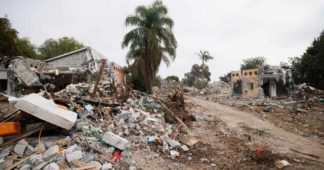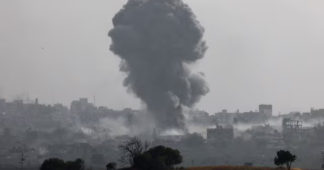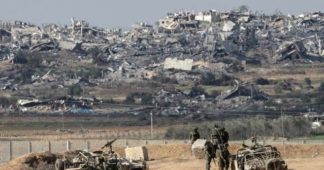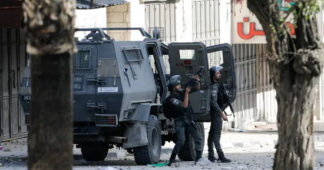May 22, 2024
JERUSALEM (AP) — Chaim Otmazgin had tended to dozens of shot, burned or mutilated bodies before he reached the home that would put him at the center of a global clash.
Working in a kibbutz that was ravaged by Hamas’ Oct. 7 attack, Otmazgin — a volunteer commander with ZAKA, an Israeli search and rescue organization — saw the body of a teenager, shot dead and separated from her family in a different room. Her pants had been pulled down below her waist. He thought that was evidence of sexual violence.
He alerted journalists to what he’d seen. He tearfully recounted the details in a nationally televised appearance in the Israeli Parliament. In the frantic hours, days and weeks that followed the Hamas attack, his testimony ricocheted across the world.
But it turns out that what Otmazgin thought had occurred in the home at the kibbutz hadn’t happened.
Beyond the numerous and well-documented atrocities committed by Hamas militants on Oct. 7, some accounts from that day, like Otmazgin’s, proved untrue.
“It’s not that I invented a story,” Otmazgin told The Associated Press in an interview, detailing the origins of his initial explosive claim — one of two by ZAKA volunteers about sexual violence that turned out to be unfounded.
“I couldn’t think of any other option” other than the teen having been sexually assaulted, he said. “At the end, it turned out to be different, so I corrected myself.”
But it was too late.
The United Nations and other organizations have presented credible evidence that Hamas militants committed sexual assault during their rampage. The prosecutor for the International Criminal Court, Karim Khan, said Monday he had reason to believe that three key Hamas leaders bore responsibility for “rape and other acts of sexual violence as crimes against humanity.”
Though the number of assaults is unclear, photo and video from the attack’s aftermath have shown bodies with legs splayed, clothes torn and blood near their genitals.
However, debunked accounts like Otmazgin’s have encouraged skepticism and fueled a highly charged debate about the scope of what occurred on Oct. 7 — one that is still playing out on social media and in college campus protests.
Some allege the accounts of sexual assault were purposely concocted. ZAKA officials and others dispute that. Regardless, AP’s examination of ZAKA’s handling of the now debunked stories shows how information can be clouded and distorted in the chaos of the conflict.
As some of the first people on the scene, ZAKA volunteers offered testimony of what they saw that day. Those words have helped journalists, Israeli lawmakers and U.N. investigators paint a picture of what occurred during Hamas’ attack. (ZAKA, a volunteer-based group, does not do forensic work. The organization has been a fixture at Israeli disaster sites and scenes of attacks since it was founded in 1995. Its specific job is to collect bodies in keeping with Jewish law.)
Still, it took ZAKA months to acknowledge the accounts were wrong, allowing them to proliferate. And the fallout from the debunked accounts shows how the topic of sexual violence has been used to further political agendas.
Israel points to sexual violence on Oct. 7 to highlight what it says is Hamas’ savagery and to justify its wartime goal of neutralizing any repeated threat coming from Gaza. It has accused the international community of ignoring or playing down evidence of sexual violence claims, alleging anti-Israel bias. It says any untrue stories were an anomaly in the face of the many documented atrocities.
In turn, some of Israel’s critics have seized on the ZAKA accounts, along with others shown to be untrue, to allege that the Israeli government has distorted the facts to prosecute a war — one in which more than 35,000 Palestinians have been killed, many of them women and children, according to Gaza health officials.
A U.N. fact-finding team found “reasonable grounds” to believe that some of those who stormed southern Israel on Oct. 7 had committed sexual violence, including rape and gang rape. But the U.N. investigators also said that in the absence of forensic evidence and survivor testimony, it would be impossible to determine the scope of such violence. Hamas has denied its forces committed sexual violence.
Continue reading at apnews.com
We remind our readers that publication of articles on our site does not mean that we agree with what is written. Our policy is to publish anything which we consider of interest, so as to assist our readers in forming their opinions. Sometimes we even publish articles with which we totally disagree, since we believe it is important for our readers to be informed on as wide a spectrum of views as possible.











